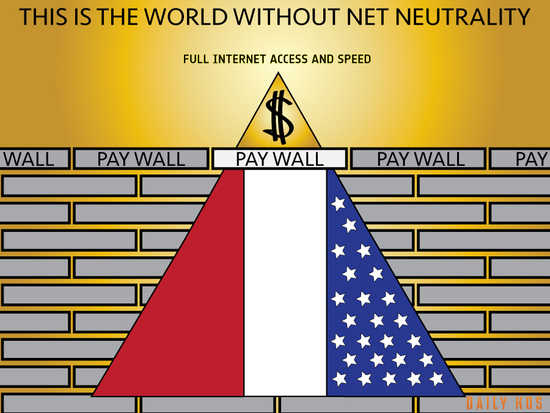Search
Recent comments
- stenography.....
6 hours 47 min ago - black....
6 hours 45 min ago - concessions.....
7 hours 47 min ago - starmerring....
11 hours 52 min ago - unreal estates....
15 hours 38 min ago - nuke tests....
15 hours 42 min ago - negotiations....
15 hours 45 min ago - struth....
1 day 5 hours ago - earth....
1 day 6 hours ago - sordid....
1 day 6 hours ago
Democracy Links
Member's Off-site Blogs
net neutrality .....
- By John Richardson at 13 Sep 2014 - 10:16am
- John Richardson's blog
- Login or register to post comments

towards an undemocratic internet...
The Federal Communications Commission released a plan on Tuesday to dismantle landmark regulations that ensure equal access to the internet, clearing the way for internet service companies to charge users more to see certain content and to curb access to some websites.
The proposal, made by the F.C.C. chairman, Ajit Pai, is a sweeping repeal of rules put in place by the Obama administration. The rules prohibit high-speed internet service providers, or I.S.P.s, from stopping or slowing down the delivery of websites. They also prevent the companies from charging customers extra fees for high-quality streaming and other services.
The announcement set off a fight over free speech and the control of the internet, pitting telecom titans like AT&T and Verizon against internet giants like Google and Amazon. The internet companies warned that rolling back the rules could make the telecom companies powerful gatekeepers to information and entertainment. The telecom companies say that the existing rules prevent them from offering customers a wider selection of services at higher and lower price points.
“Under my proposal, the federal government will stop micromanaging the internet,” Mr. Pai said in a statement. “Instead, the F.C.C. would simply require internet service providers to be transparent about their practices so that consumers can buy the service plan that’s best for them.”
Mr. Pai, a Republican who has pursued an aggressive deregulation agenda, was widely expected to have his plan approved during a meeting on Dec. 14. The two other Republicans on the commission generally vote with Mr. Pai, giving them a majority over the two Democrats.
Telecom and internet companies are expected to lobby hard in Washington — and directly to the public — as they did when the current rules were adopted.
Some internet companies were expected to put up a fight to prevent the proposal from taking hold. The Internet Association, an industry group, joined a legal effort in 2015 to protect the existing rules. The agency has already received 20 million public comments, many of them in opposition of changing the rules, since Mr. Pai announced the broad outlines of his thinking early this year.
The big companies that provide internet access to phones and computers have fought for years against broadband regulations. Under the new plan, broadband providers will be able to block access, slow down or speed up service for its business partners in some cases — as long as they notify customers.
“This action will return broadband in the U.S. to a regulatory regime that emphasizes private investment and innovation over lumbering government intervention,” said Joan Marsh, a vice president at AT&T.
Big online companies like Google and Facebook say the repeal proposal would allow telecom companies to play favorites by charging customers for accessing some sites or by slowing speeds to others. The existing rules were written to prevent such arrangements, adopting a policy often called net neutrality.
“We are disappointed that the proposal announced today by the F.C.C. fails to maintain the strong net neutrality protections that will ensure the internet remains open for everyone,” Erin Egan, a vice president at Facebook, said in a statement. “We will work with all stakeholders committed to this principle.”
Small online companies believe the proposal would hurt innovation, because telecom companies could force them to pay more for the faster connections. Only the largest companies, they say, would be able to afford the expense of making sure their sites received preferred treatment. Companies like Etsy and Pinterest, for example, credit their start to the promise of free and open access on the internet.
read more:
https://www.nytimes.com/2017/11/21/technology/fcc-net-neutrality.html